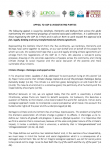Cardinals, patriarchs and bishops representing the five continental groupings of national episcopal conferences have made an appeal to the 21st session of the Conference of the Parties (COP 21) to the UNFCCC, which will meet in Paris, France in December 2015.
The appeal, which follows other calls by religious leaders of all faiths, outlines a ten-point policy proposal, linking climate change to social injustice and the exclusion of the world's poorest and most vulnerable.
 26 October 2015: Cardinals, patriarchs and bishops representing the five continental groupings of national episcopal conferences have made an appeal to the negotiators at the 21st session of the Conference of the Parties (COP 21) to the UNFCCC, which will meet in Paris, France in December 2015. The appeal, which follows other calls by religious leaders of all faiths, outlines a ten-point policy proposal, linking climate change to social injustice and the exclusion of the world’s poorest and most vulnerable.
26 October 2015: Cardinals, patriarchs and bishops representing the five continental groupings of national episcopal conferences have made an appeal to the negotiators at the 21st session of the Conference of the Parties (COP 21) to the UNFCCC, which will meet in Paris, France in December 2015. The appeal, which follows other calls by religious leaders of all faiths, outlines a ten-point policy proposal, linking climate change to social injustice and the exclusion of the world’s poorest and most vulnerable.
It calls on those who will be negotiating at COP 21 to approve a “fair, legally binding and truly transformational climate agreement” that is supported by all and based on the principles of “solidarity, justice and participation.”
The appeal references the encyclical of Pope Francis, which contends that “climate change represents one of the principal challenges facing humanity today,” and invites universal solidarity that is “intergenerational” and “intragenerational.” It also states that legal frameworks are required that “clearly establish boundaries and ensure the protection of the ecosystem.” The bishops emphasize that scientific evidence suggests that accelerated climate change is the result of “unrestrained human activity” and that “excessive reliance on fossil fuels is primarily responsible.” Thus, the Pope and bishops call for a drastic reduction in emissions, and state that the agreement must: limit global temperature rise to within “those parameters currently suggested from within the global scientific community;” and take into account common but differentiated responsibilities.
The ten points are to: consider not only the technical, but the ethical and moral dimensions of climate change; accept that the climate and atmosphere are global common goods belonging to all; adopt a fair, transformational and legally binding global agreement that recognizes the need to live in harmony with nature and guarantees human rights for all, including those of Indigenous Peoples, women, youth and workers; limit a global temperature increase and aim for complete decarbonization by mid-century; ensure that the temperature threshold is enshrined in a legally binding global agreement, with ambitious mitigation commitments and actions from all countries recognizing common but differentiated responsibilities and respective capabilities, based on equity and historical responsibility; ensure mandatory periodic reviews of government pledges based on science and equity; develop new models of development and lifestyles that are climate compatible, address inequality and lift people out of poverty; ensure access to water and land for climate resilient and sustainable food systems; ensure inclusion and participation of the poorest and most vulnerable at all levels of the decision-making process; ensure the agreement delivers on adaptation; recognize that adaptation needs are contingent on the success of mitigation measures; and provide roadmaps on how countries will meet the provision of predictable, consistent and additional finance commitments. [Bishops’ Appeal to COP 21] [Text of Appeal to COP 21 Negotiating Parties][IISD RS Story on Call by Religious Leaders for Ambitious Climate Action]